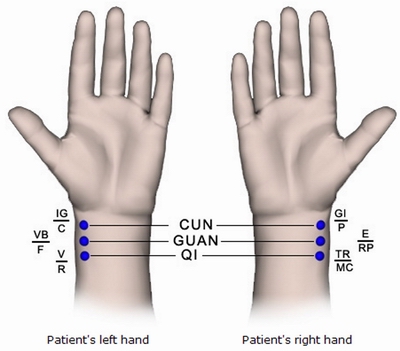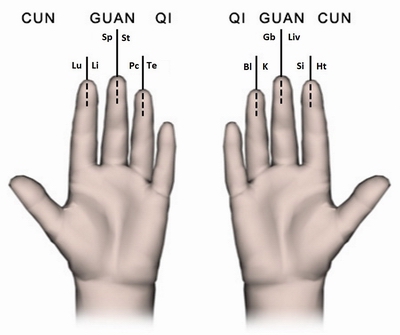Details of using:
The channels the pulse of which is taken in the same points but on different hands have a close connection which is a base of the "husband-wife" treatment rule. According to the traditional Chinese medicine, blood from the "point" of heart flows in different directions in male and female bodies: to the left in men and to the right in women; thus the correspondence of the channels in the female cun point under the doctor's forefingers on the right and left hands is opposite to the correspondence of male's body (see the table below).
If the patient is male, then the pulse on the left hand is to be examined first; if female - on the right hand, i.e. the pulse of the channel of heart is examined first.
The level of the pulse allows to localize the pathological process: when the pulse is superficial, "the illness is on the surface", in case of deep pulse "the illness has got inside"; if the pulse is slow and weak - Yin is exhausted, if the pulse is rather rapid - the "flourishing of Yang" is in progress.
According to the traditional Chinese medicine, there are three types of healthy pulse: male, female and neutral. The "male" pulse is intensive and powerful; "female" is subyle, rapid and strong; the "neutral" pulse is quiet, slow, soft, it is a combination of male and female types of the pulse. An indication of healthy pulse is the stability of the pulsebeats' force and their evenness, five pulsebeats per one respiratory cycle (inhalation -exhalation).
According to the traditional Chinese medicine the energy of blood flows through the person's body with the speed of 50 full rounds a day, and that is essential for maintenance of the five ZANG organs. If the speed of circulation of energy changes, it is abnormal. When taking the pulse it is possible to determine if the energy of the body is weak or strong. If the pulse beats 50 times without breaks of the rhythm, all five ZANG organs are healthy and in there is enough energy in them. If of the 40 pulsebeats one is missing, then one of the ZANG organs is ill; if one of 30 pulsebeats one is missing - two ZANG organs are ill; one of 20 - shows on the unhealthy condition of three ZANG organs, etc. By counting missing heartbeats a doctor may determine whether the energy in internal organs will suffice for a long time or not.
When formulating a diagnosis the doctor should take into account the season when the examination of the patient is taking place so that not to run into an error and take a healthy but seasonally modified pulse for an unhealthy one. According to the traditional Chinese medicine each of the four seasons lasts 90 days, the first 72 days of each are the season proper, and last 18 days are an off-season time; four off-season periods make a "fifth season" which totally takes 72 days also; such division corresponds to the WU XING cycle. About the NONG LI calendar: http://en.nongli.info/
72 [main] days of each season the pulse of corresponding main organ will dominate in a healthy pulse, in off-season period ("the fifth season") dominates the pulse of the channel of spleen (element Earth). So the first season of the year is Spring (according to the Chinese calendar, year begins after the winter ends - see "calendar"); Spring corresponds to Wood and liver, therefore within 72 days of spring the pulse of the channel of liver will dominate even in the patient with impaired function of liver. In consequent 18 vernal days dominates the pulse of the channel of spleen. Summer corresponds to Fire and heart, therefore, within 72 days of summer the pulse of the channel of heart will dominate, and in consequent 18 days - the pulse of the channel of spleen, etc.

Projection of the channels on doctor's fingers at pulse taking

Correspondence of channels to the pulse examination points
|
Point of pulse |
Depth of pulse taking |
Male patient left wrist ("husband") |
Male patient right wrist ("wife") |
Female patient left wrist |
Female patient right wrist |
| Cun | surface | small intestine (Yang) | large intestine (Yang) | large intestine (Yang) | small intestine (Yang) |
| deep | heart (Yin) | lungs (Yin) | lungs (Yin) | heart (Yin) | |
| Guan | surface | gallbladder (Yang) | stomach (Yang) | gallbladder (Yang) | stomach (Yang) |
| deep | liver (Yin) | spleen (Yin) | liver (Yin) | spleen (Yin) | |
| Chi | surface | urinary bladder (Yang) | triple warmer (Yang) | urinary bladder (Yang) | triple warmer (Yang) |
| deep | kidneys (Yin) | pericardium (Yin) | kidneys (Yin) | pericardium (Yin) |

